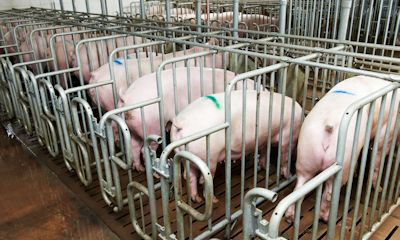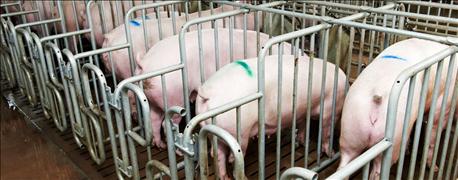February 12, 2016

By Tyler Harris and Curt Arens
Last week, the Nebraska unicameral legislature voted 34-14 to pass the heavily-debated LB176, which was signed by Gov. Pete Ricketts on Thursday. The measureis intended to remove the ban on packer ownership of hogs in Nebraska that was put in place in 1998. The debate has been divided among different ag groups and senators since it was introduced in January last year by Sen. Ken Schilz of Ogallala.
Here's what a few in agriculture have to say:

LB176, which was signed by Gov. Ricketts on Thursday, is intended to remove the ban on packer ownership of hogs in Nebraska that was put in place in 1998.
Independent Cattlemen of Nebraska
Independent Cattlemen of Nebraska (ICON) was one of the state's livestock groups opposing LB176. ICON President, David Wright of Neligh says that in the case of harvesting finished livestock like cattle or hogs, the window for marketing becomes narrow because the livestock reaches its desired condition. "If you market livestock to the processor or the packers before or after the desired condition is achieved, you will incur a discount from the processor or the packer," Wright explains. "The Competitive Livestock Markets Act was passed to insure that the processor or packer was unable to control that narrow window of maximum income. The Act allows a five day window in which processors or packers can own livestock for the purpose of meeting their slaughtering schedules," he says.
"Now, LB176 will allow the packer to control that narrow window of maximum income for themselves and require everyone else to meet their slaughtering schedule needs. It's just another way to bring back the truck system, debt bondage or as Tennessee Ernie Ford used to sing, the Company Store." Wright worries openly that now that the CLMA has been weakened, the courts will soon abolish it altogether because of discrimination against beef.
Nebraska Farmers Union
Nebraska Farmers Union President, John Hansen says that healthy ag markets should reward hard work and risk with profit. He says that LB176 replaces an entire marketing system with a one-sided vertically integrated contracting system controlled by the processor, similar to poultry. "Broiler production no longer has a cash market," Hansen explains. "Growers compete with one another to see how low they will go to grow the packer's livestock, so it is a race to the economic bottom of the barrel," he says. "Profit centers along with Nebraska's pork will be exported from rural communities. And the contract system will not serve independent family farm agriculture well over time," Hansen adds.
Nebraska Pork Producers Association
Among proponents of the bill is the Nebraska Pork Producers Association. NPPA executive director Al Juhnke notes Nebraska is the last state to allow packers to own or lease animals to independent producers – but that doesn't mean producers haven't been able to contract finish hogs with other non-packer companies, or even with packers outside of Nebraska.
"This year the Attorney General's opinion found that if you're a packer in Iowa or Minnesota or Missouri, you can own pigs in Nebraska, and you have to ship them back to your state to process them," Juhnke says. "It becomes an economic develop issue where we were discriminating against only those three packers in Nebraska – Tyson, Hormel, and Smithfield."
Opponents have argued the bill would hurt the independent pork producer, but Juhnke says it's apparent by looking at other states that allow packer ownership that that will not be the case. "It's a tool in the independent producer's toolbox," he says. "It's hard to get into the farming business now. If you're young and want to buy into a farming operation, it's hard to buy 2,000 to 3,000 acres for row crops, but one thing folks can do is build a swine finishing facility."
Nebraska Farm Bureau
Nebraska Farm Bureau is also among the groups that have supported LB176. Nebraska Farm Bureau President Steve Nelson says since the ban was put in place in 1998, Nebraska has missed out on an opportunity to grow its pork production sector, and the bill provides an opportunity to bring more packers into Nebraska.
"For a long time, we've farrowed more pigs than we've finished, and it doesn't make much sense with the amount of corn and soybeans that we grow," Nelson says. "All of our surrounding states have increased pork production at a much greater rate than we have."
In addition to providing some opportunities for young producers to come back to the farm, Nelson notes building a hog barn provides an opportunity to diversify the farming operation, and a big part of that is the added value that manure brings.
"That is a huge piece of the value of pork production today. We have a lot of productive land that can take advantage of those nutrients," he says. "For a long time, we've trended away from being diversified, and lots of trends toward specialization. Bringing livestock back in provides diversity and provides highly valuable nutrients today to that farming operation."
You May Also Like




